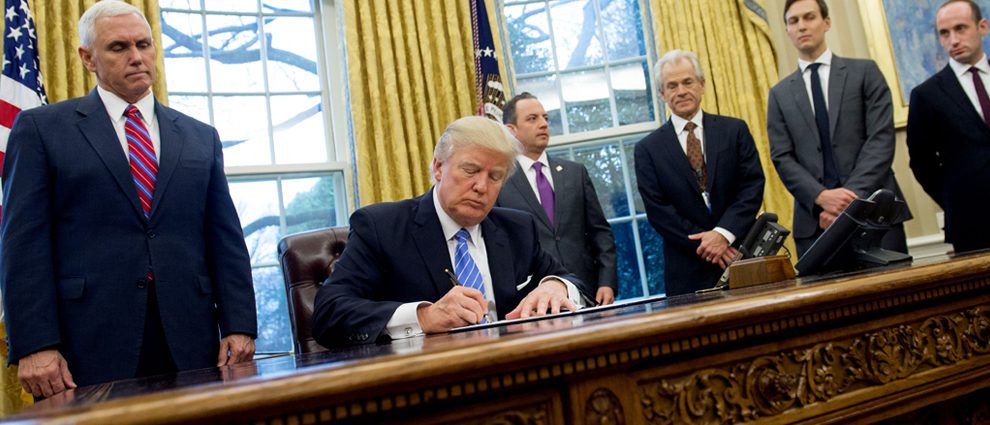The New Administration and Human Trafficking
Last month, Donald Trump was inaugurated as the 45th president of the US. So far, his administration has passed numerous executive orders that have received intense backlash from the left. In addition, the Republican-led congress has confirmed a number of Trump’s cabinet nominees with strong resistance from the liberal camp. Historically, the issue of human trafficking has received bipartisan support. In light of President’s Day and given the recent shift of power, this blog explores the new administration’s stance on human trafficking.

The good news is, it appears that the administration knows what human trafficking is and that it is important to combat. On February 9, 2017, Trump signed an executive order to increase efforts targeting transnational criminal organizations, including human trafficking rings. The executive order states, “the trafficking and smuggling of human beings by transnational criminal groups risks creating a humanitarian crisis.”
However, the Alliance to End Slavery and Trafficking (ATEST), a broad coalition of US-based organizations released a strong statement arguing that the executive order is not sufficient to combat trafficking. “The framing of this order represents a significant departure from a long-standing victim-centered approach that is critical to successfully eradicating human trafficking and that is enshrined in existing law,” the ATEST statement says. “For nearly two decades, the U.S. has implemented a strategy centered around protection of victims, prevention of the conditions that allow trafficking to flourish, prosecution of perpetrators, and partnership with civil society and the private sector. By only focusing on human trafficking from a law enforcement perspective, the executive order undermines this proven approach and jeopardizes U.S. leadership on combating this horrific crime.”
ATEST outlined a number of ways the administration should broaden its strategy, noting the radio silence the administration had regarding marginalized communities most affected by trafficking in the executive order. These groups include runaway and homeless youth; foster youth; the lesbian, gay, bisexual, transgender, intersex, and queer (LGBTIQ) community; Native Americans; Asian Americans and Pacific Islanders; migrant workers; youth of color; children; low literacy or numeracy individuals; and those with disabilities. Many of these communities have been attacked and further marginalized by Donald Trump, his administration, and his cabinet picks.
One group particularly vulnerable to trafficking, refugees and immigrants, has been specifically targeted by the Trump administration in the “Border Security and Immigration Enforcement Improvements” executive order, signed on January 25. According to ATEST, “traffickers often use immigration status as a tool of coercion to exploit immigrant communities, both documented and undocumented. Local enforcement of immigration law, as mandated under the executive order for “Border Security and Immigration Enforcement Improvements,” will irreparably damage law enforcement’s ability to identify, investigate and prosecute traffickers. Both executive orders will result in an imbalanced approach that is likely to exacerbate immigrants’ vulnerabilities and assist traffickers preying on these communities.” Human Trafficking Search previously wrote about human trafficking and refugees here.
In addition, a leaked draft memo of a new executive order reportedly seeks to target the Conflict Minerals Rule, which requires companies to disclose whether their products contain minerals from the war-torn Democratic Republic of Congo, where documented slavery in mines has been found to support armed groups and fuel war. The rule has been largely successful in decreasing slavery and curbing conflict. However, it has been loathed by business groups, who find its requirements costly and burdensome. The executive order would suspend the rule for two years.
While the Trump administration recognizes human trafficking as an issue, more needs to be done to address the issue. To properly combat human trafficking, it is essential that the administration recognize the intersectional nature of the issue with other issues, including economic inequality, racism, immigration, healthcare, and the environment. Without tackling the root causes of trafficking, the administration will be incapable of adequately addressing the issue.
Firas Nasr is the Director of Communications of Human Trafficking Search.
